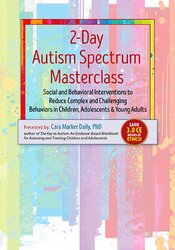

Every individual with High-Functioning Autism (HFA) is extremely different, which can make providing treatment very difficult.
They have unique abilities in visual-spatial processing, rule-following, sensory perception, and detailed memory, but also deficits in executive functioning, integrative processing, and other complex cognitive skills. Thus, they are more prone to the co-occurring challenges of anxiety, depression, aggression, poor self-regulation, inattention, and social skill deficits.
Watch autism expert and author, Cara Daily, PhD, BCBA, for this 2-day certificate training and learn how to integrate essential cognitive-behavioral therapy (CBT) tools, evidence-based behavioral interventions and successful psychosocial techniques to effectively teach your clients with HFA (0-25 years) to regulate their emotions, develop impulse control, and improve their behaviors.
You will receive in-depth specialized training in using:
Through engaging case studies, and hands-on demonstrations and activities, you will leave this training with the knowledge and skills required to confidently assess and treat your clients with autism!
| File type | File name | Number of pages | |
|---|---|---|---|
| Manual - Cognitive Behavioral Interventions for High-Functioning Autism (6.03 MB) | 100 Pages | Available after Purchase |

Cara Marker Daily, PhD, BCBA, is a licensed psychologist and a Board Certified Behavior Analyst with over 20 years of experience providing assessment and treatment for children, adolescents and young adults with autism in the home, school, hospital and community settings. She works directly with educators, speech/language pathologists, occupational therapists, BCBAs and other professionals. Dr. Daily is the president and training director of Daily Behavioral Health, a leading behavioral health provider in northeast Ohio specializing in assessment, consultation, and treatment of autism, anxiety and disruptive behavior disorders. She is the founder and executive director of the Building Behaviors Autism Center, which has received numerous grants to provide free and reduced cost applied behavioral analysis services to individuals with autism.
Dr. Daily has written several cognitive-behavioral and behavioral-based curriculums focusing on teaching daily living skills to children with autism and published a peer-reviewed journal article supporting evidence for success of these programs. She has presented nationally on topics of autism, disruptive behaviors disorders, anxiety and chronic health conditions in the pediatric population. Dr. Daily has been featured in radio, television, and other media platforms in northeast Ohio. She is the author of The Key to Autism: An Evidence-Based Workbook for Assessing and Treating Children & Adolescents (PESI, 2016).
Dr. Daily received her Ph.D. in School Psychology at the University of South Carolina, and completed an internship in Pediatric Psychology at the Children’s Hospital of Philadelphia and a postdoctoral fellowship in Pediatric Psychology at The Children’s Hospital at The Cleveland Clinic. Dr. Daily is a member of the Department of Pediatrics at Fairview Hospital at the Cleveland Clinic, the American Psychological Association, the Ohio Psychological Association, and the Christian Association of Psychological Studies.
Speaker Disclosures:
Financial: Cara Marker Daily is the president/training director for Daily Behavioral Health, Inc. She is the founder/executive director of the Building Behaviors Autism Center. She is an author for PESI Publishing & Media and receives royalties. Dr. Daily receives a speaking honorarium from PESI, Inc. She has no relevant financial relationships with ineligible organizations.
Non-financial: Cara Marker Daily is a community advisory board member of the Fairview Hospital. She is a board member for Building Behaviors Autism Center. She is a member of the American Psychological Association and the Ohio Psychological Association.
|
2-Day Autism Spectrum Masterclass: Social and Behavioral Interventions to Reduce Complex and Challenging Behaviors in Children, Adolescents & Young Adults
Copyright: 14/11/2019 - Product Code POS054190 |
Please wait ...